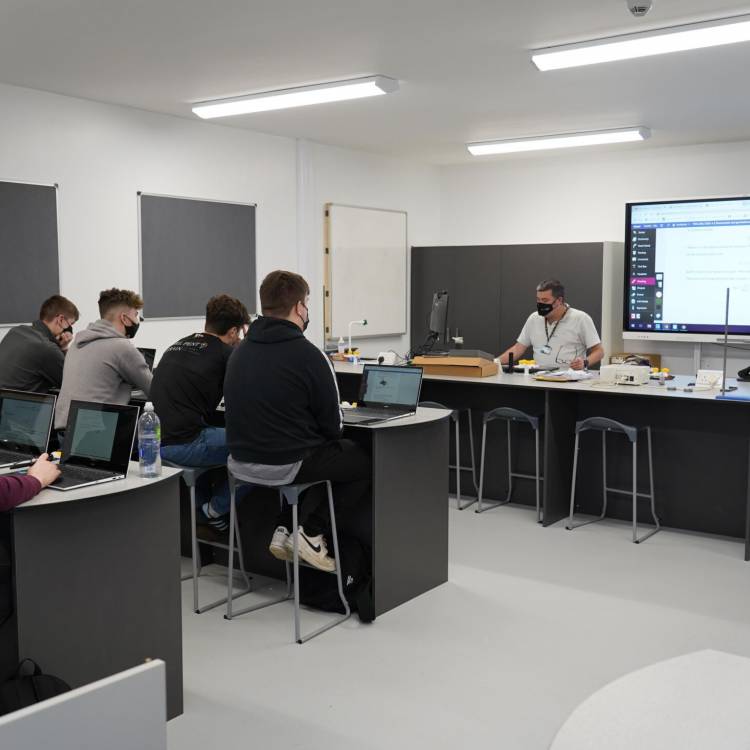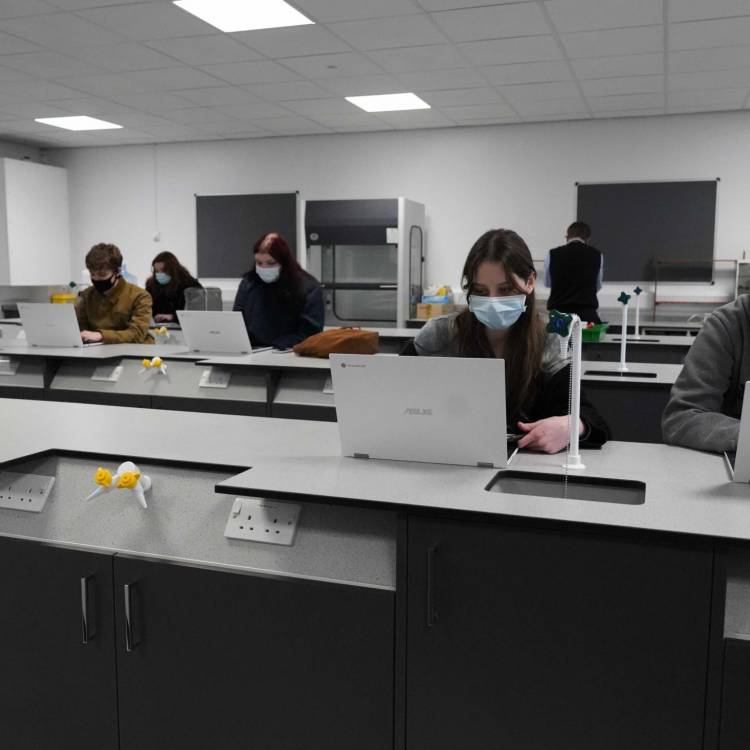Grŵp Llandrillo Menai Tackles Digital Exclusion
Grŵp Llandrillo Menai (GLLM) has put in action a number of measures to increase digital inclusion amongst all students and staff. Having learnt from the experiences during the pandemic, it is hoped that this initiative will be seen as a positive Covid legacy.
The newly published 'Digital Entitlement Statement' aims to make sure that all learners can access courses digitally and remotely through the provision of equipment and connectivity.
It also addresses how the Grŵp will provide training and support for staff to deliver programmes and services digitally.
With £1.5m allocated per annum to digitally support learners and staff, many initiatives have already been rolled out. These include the installation of classroom cameras, extensive training in digital teaching and learning, significant investment in mobile technology and devices to support digital learning in college and at home, and development of excellent vocational digital learning packages.
Thanks to Welsh Government funding, the Grŵp is making digital devices and MiFis available to learners to enable remote learning and self-study. Over 1,000 chromebooks have been lent to learners in each of the last two academic years.
The Grŵp’s e-resource usage has increased from just under 20,000 in 2015-16 to 204,000 in 2020/21. It is not only the highest user of e-books out of all the Further Education colleges in Wales, but is also amongst the highest in the UK.
GLLM Chief Executive Dafydd Evans explained: "Covid-19 has fundamentally changed the way we deliver education opportunities to learners. We have learned from the pandemic how important digitalisation is within the education sector.
"More strands of college life are becoming ‘digital by default’ and learners are increasingly going online to communicate, to access information about their courses, and access support.
"This transformation offers learners a more intuitive, accessible and responsive service delivery. However, the successful delivery of online courses and support services relies on the ability of learners to access and interact with them in ways that suit their needs."
Whilst the Statement applies to all learners and staff, a key priority is to address the needs of learners who are currently digitally excluded - including those with specific learning needs or who require additional support because they live in an area of deprivation.
The Statement identifies many factors contributing to digital exclusion among learners. The socially isolated and economically disadvantaged tend to have more limited access to, and use of, the internet, devices and online services. People with disabilities are less likely to use the internet or have access at home than people without.
Furthermore, poor - or no - broadband and mobile infrastructure is more likely to be experienced by younger people and those living in remote areas. This is a particular factor for a college Grŵp that provides education to learners in a very geographically dispersed and rural area.
Dafydd added: "The increasing reliance on digital technology not only requires learners to be able to connect to the internet and have access to appropriate devices. It also means that they will need to utilise specific digital skills in order to get online and take part in their courses.
"Through the achievement of the actions included in our Digital Entitlement Statement, we want to lead the way in addressing some of the demographic inequalities and make sure that all learners and staff have the same opportunity to interact with our courses and services digitally."
The newly published 'Digital Entitlement Statement' aims to make sure that all learners can access courses digitally and remotely through the provision of equipment and connectivity.
It also addresses how the Grŵp will provide training and support for staff to deliver programmes and services digitally.
With £1.5m allocated per annum to digitally support learners and staff, many initiatives have already been rolled out. These include the installation of classroom cameras, extensive training in digital teaching and learning, significant investment in mobile technology and devices to support digital learning in college and at home, and development of excellent vocational digital learning packages.
Thanks to Welsh Government funding, the Grŵp is making digital devices and MiFis available to learners to enable remote learning and self-study. Over 1,000 chromebooks have been lent to learners in each of the last two academic years.
The Grŵp’s e-resource usage has increased from just under 20,000 in 2015-16 to 204,000 in 2020/21. It is not only the highest user of e-books out of all the Further Education colleges in Wales, but is also amongst the highest in the UK.
GLLM Chief Executive Dafydd Evans explained: "Covid-19 has fundamentally changed the way we deliver education opportunities to learners. We have learned from the pandemic how important digitalisation is within the education sector.
"More strands of college life are becoming ‘digital by default’ and learners are increasingly going online to communicate, to access information about their courses, and access support.
"This transformation offers learners a more intuitive, accessible and responsive service delivery. However, the successful delivery of online courses and support services relies on the ability of learners to access and interact with them in ways that suit their needs."
Whilst the Statement applies to all learners and staff, a key priority is to address the needs of learners who are currently digitally excluded - including those with specific learning needs or who require additional support because they live in an area of deprivation.
The Statement identifies many factors contributing to digital exclusion among learners. The socially isolated and economically disadvantaged tend to have more limited access to, and use of, the internet, devices and online services. People with disabilities are less likely to use the internet or have access at home than people without.
Furthermore, poor - or no - broadband and mobile infrastructure is more likely to be experienced by younger people and those living in remote areas. This is a particular factor for a college Grŵp that provides education to learners in a very geographically dispersed and rural area.
Dafydd added: "The increasing reliance on digital technology not only requires learners to be able to connect to the internet and have access to appropriate devices. It also means that they will need to utilise specific digital skills in order to get online and take part in their courses.
"Through the achievement of the actions included in our Digital Entitlement Statement, we want to lead the way in addressing some of the demographic inequalities and make sure that all learners and staff have the same opportunity to interact with our courses and services digitally."

